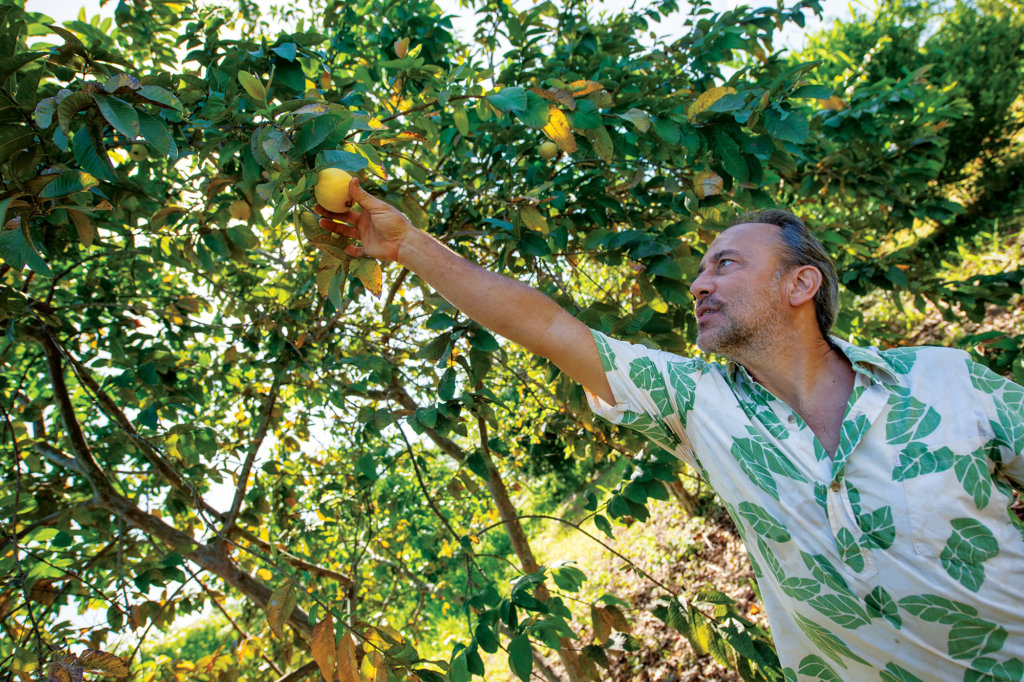

Alumni, students and faculty help the hungry
BY NADINE KAM
In the most austere societies, the minimum for human survival are shelter and access to food and water, essentials most Americans took for granted until the arrival of COVID-19 showed how close many families live on the verge of emergency.
Food insecurity is defined as the lack of enough food for all household members to sustain an active, healthy life. According to a recent study by the University of Hawai‘i at Mānoa College of Social Sciences, “Addressing Hunger and Food Insecurity among Hawai‘i’s Families,” 48% of Hawai‘i families with children are experiencing food insecurity, with 15% reporting that they did not have enough food in the past week.
This one-out-of-every-two-families ratio is far greater than the oneout- of-six experiencing food insecurity nationwide. But embedded in Hawai‘i’s culture is the spirit of kōkua or lending a helping hand. At its root are the values of cooperation, consideration for others and supporting the community in whatever way possible. That spirit continues to thrive at Punahou, where students, faculty and alumni heed the call to help the hungry.
Backed by a Punahou ethos cultivating ingenuity and problem-solving solutions to local and global issues, community assistance has taken the form of organized food drives, food distribution and outreach, farm donations, app creation and soon, a solar-powered refrigerator to enable food exchange in the community.
President Mike Latham ’86 sees the Punahou community’s involvement as reflective of a core School mission to encourage students and eventual graduates to apply their knowledge to tackle authentic, realworld challenges. “All of the most complex challenges our society faces today, including problems like climate change, renewable energy, human migration or food security, are inherently interdisciplinary,” he says. “To address them, our students have to learn how to collaborate in teams, draw information from multiple fields and think across cultural boundaries. I believe that today’s graduates are eager to find principled causes they can contribute to, and the pandemic has heightened that desire.”
Here’s a look at some of the work being done by the Punahou community regarding food insecurity in Hawai‘i.
Mark Hamamoto ’80

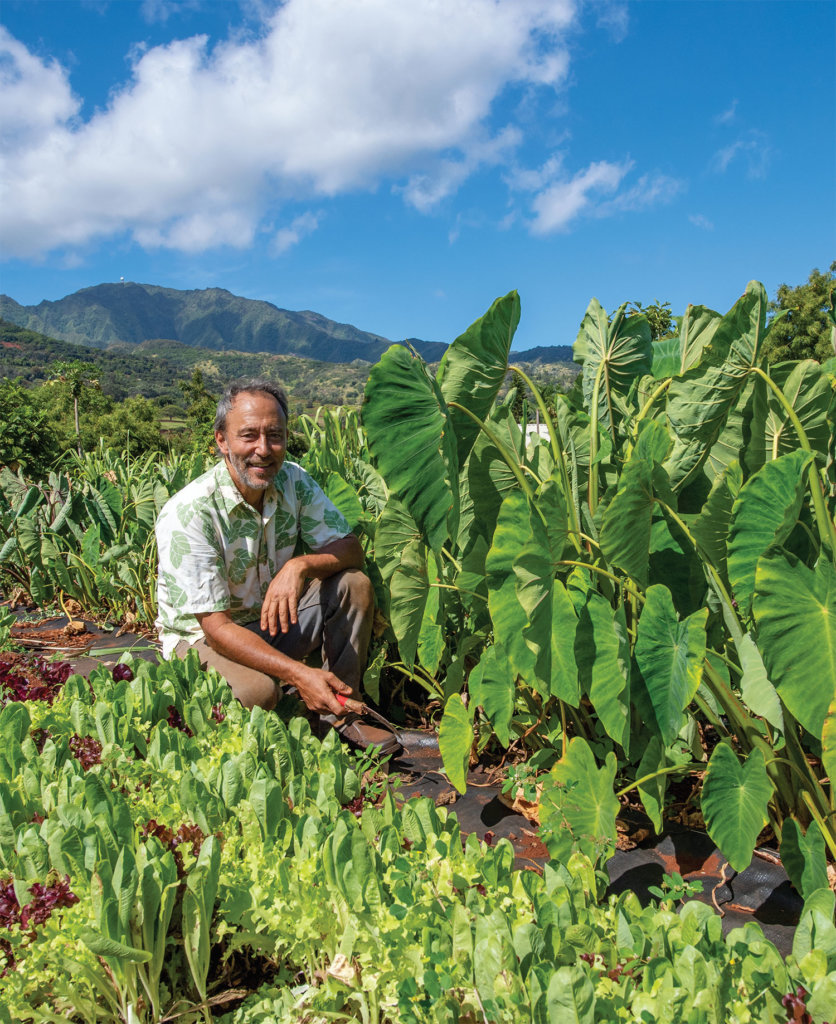
Mark Hamamoto ’80 grew up with neighbors who didn’t hesitate to share whatever was growing in their yards or what they cooked in their kitchens. Mrs. Pacheco brought over mangos to his family’s house. Mrs. Chun-Hoon gave them fried noodles every New Year’s Day. The Hamamotos, meanwhile, hand-delivered bags of lychee and tangerines.
“That was more out of food abundance than food scarcity but the motivation is still the same,” Hamamoto says. “You share with others out of a sense of community, because you care for each other.”
Most people have the single view that farms exist to produce food, but Hamamoto had a bigger vision in mind when he started Mohala Farms as a place to grow community and nourish both body and soul.
Look past the stands of ‘ulu trees and rows of kale, lettuce and basil, and you’ll see the construction of a certified commercial kitchen that, when finished, will be a place for creating value-added products, prepared foods and bringing people together for cooking classes and meals that spark the imagination of those interested in the farm’s mission or simply trying to learn how to use the variety of produce grown on the farm.
“Growing food centered around organic food production is our fundamental activity, but our mission is to make Hawai‘i a healthier community, physically and socially,” Hamamoto says.
The idea of combining farm, food and faith is not a new one, but Hamamoto saw it in action when he worked at Hoa ‘Āina O Mākaha – translated as “the land shared in friendship in Mākaha” – a farm that had been founded by Father Luigi “Gigi” Cocquio to supply food baskets, operate a soup kitchen and provide a range of assistance programs from financial and emotional support for the community.
“I got into farming because of the time I spent working at Hoa ‘Āina O Mākaha,” he says. “That farm, started by Gigi Cocquio, who is still there after 42 years, inspired me to create something similar.”
In 2005, Hamamoto found his own plot of land in Waialua, where he was eager to connect with the community. Four years later, he began contributing excess food to those in need, and he’s currently working with Hawaii Foodbank and Waialua Foodbank.
Despite hardships experienced by farms at the start of the pandemic, Hamamoto continued to contribute produce to relief programs while creating CSA boxes for people who suddenly woke up to the need to support farmers. But while the vegetables he was growing had found a ready audience among restaurateurs who had temporarily closed their dining rooms, he found himself in the role of educator as people asked, “What do I do with this?” when their boxes contained escarole, turnips and other ingredients not widely used in homes.
Eventually, he would like to be able to distribute vegetable seedlings to enable people to grow more of their own food, and the commercial kitchen will play a vital role in introducing people to a myriad of uses for produce, including some unfamiliar, but nutritious ingredients. “I’m a good example,” he said, pointing out that before becoming a farmer, “I never ate collard greens, turnips or breadfruit.”
Borrowing a page from ancient Polynesian voyagers, he’s also looking toward more sustainable crops to combat food insecurity, such as ‘ulu, cassava, plantains, sweet potatoes and dryland taro, that are able to feed many mouths with less impact on the soil than other crops that deplete them. “I consider these carbohydrate crops to be food security crops. I think that’s most important.”
In reflecting on his life’s trajectory, and his steadfast motivation to provide for his community, he acknowledges the importance of living with a purpose, something instilled in him while at Punahou. “Some of my Punahou teachers, Fred Van Dyke, Eric Kusunoki and Liz Foster, left a lasting impression on me. They were the precursors to other influential teachers and mentors that affected my life choices.”
Jennine Sullivan ’07

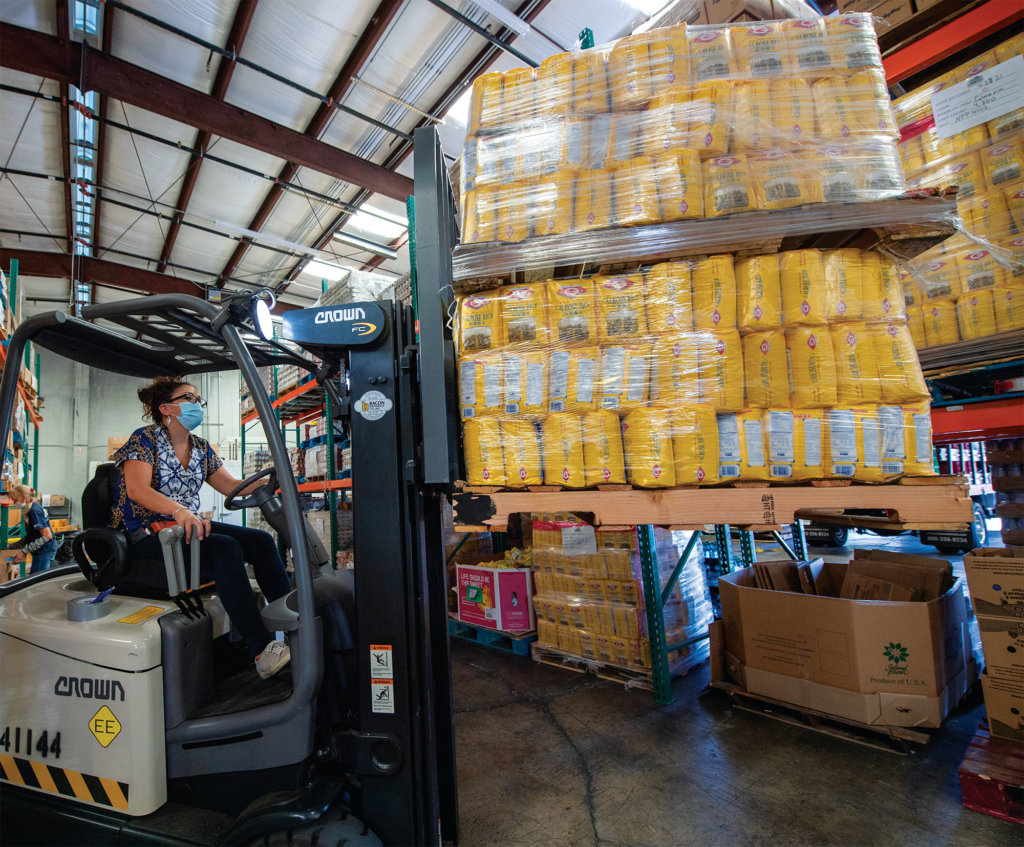
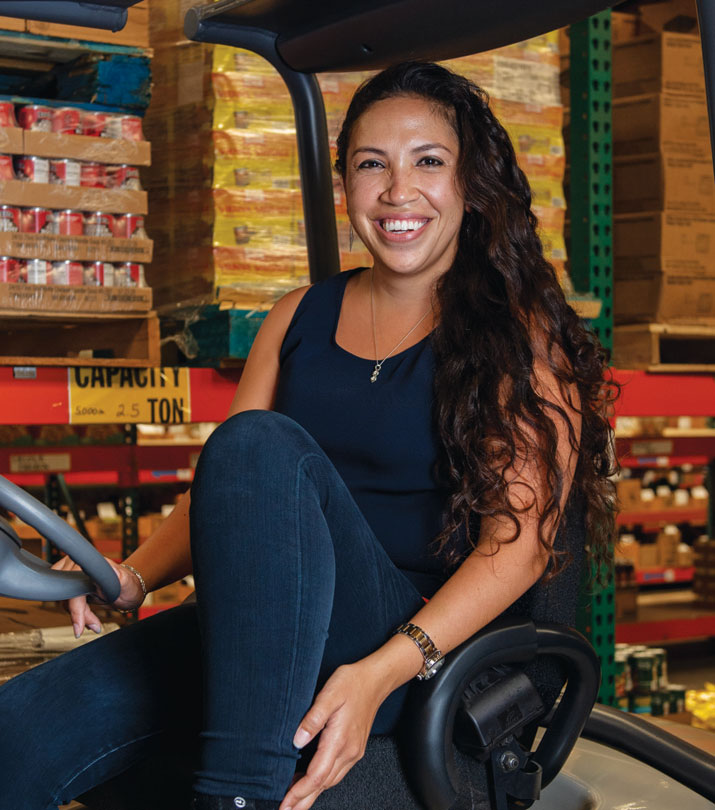
It’s Monday at The Pantry by Feeding Hawaii Together and volunteers are walking in a continuous loop around racks stacked with pasta, boxes of cereal and canned foods, “shopping” for clients who had placed their orders online or by phone ahead of food pick-ups on Tuesdays, Wednesdays and Fridays.
It’s a system that was devised at the start of the pandemic by Jennine Sullivan ’07, executive director of The Pantry, a nonprofit that provides food for O‘ahu’s needy. COVID-19 restrictions made it impossible to allow people to make food selections in person, so Sullivan pivoted the charitable organization to go digital.
Sullivan is no stranger to crisis and operations management. After graduating from Punahou, she spent 15 years living around the world, attending school and working for General Electric in areas ranging from financial management to new business creation. This led her to work with venture capitalists in San Francisco, before she branched out as an independent business strategy and operations consultant for startups.
“I was always looking for the opportunity to come home and The Pantry seemed like that perfect fit, where I could really make an impact,” she says.
Thirteen years at Punahou, she says, shaped her outlook and made her the person she is today. “Community service was a huge aspect of our day-to-day education. The emphasis was always on leadership and the idea that if you have the chance to make a difference, to take that chance.”
Among her first duties at The Pantry were to increase sourcing of food supplies, and she immediately reached out to restaurant, food distributors and other pantry partners to meet the sudden demand.
Over the past six months, The Pantry has been serving about 13,000 individuals from 5,000 families monthly. This represents 250,000 to 300,000 pounds of food going out its doors each month, about 50,000 pounds more than pre-pandemic.
The nonprofit Feeding Hawaii Together was founded more than 20 years ago with the philosophy of allowing its clientele to shop in a grocery store-style setting for their specific needs by creating The Pantry as its food distribution arm. The food comes from individuals as well as donations from farms and other food distribution networks, including Aloha Harvest and Hawaii Foodbank. Cash donations go toward purchasing food in bulk.
Different from other one-size-fits-all food distribution networks, this system eliminates waste, Sullivan said. “If you don’t need that bag of rice this week, we can make sure it goes to someone else who does. Nothing goes to waste here.”
Ezra Levinson ’23

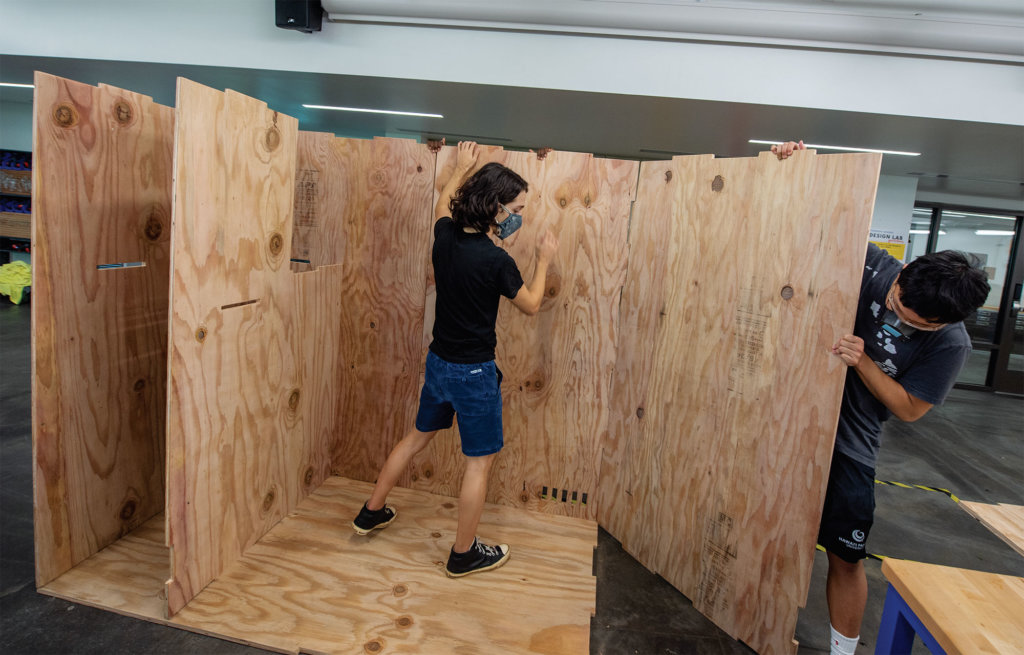
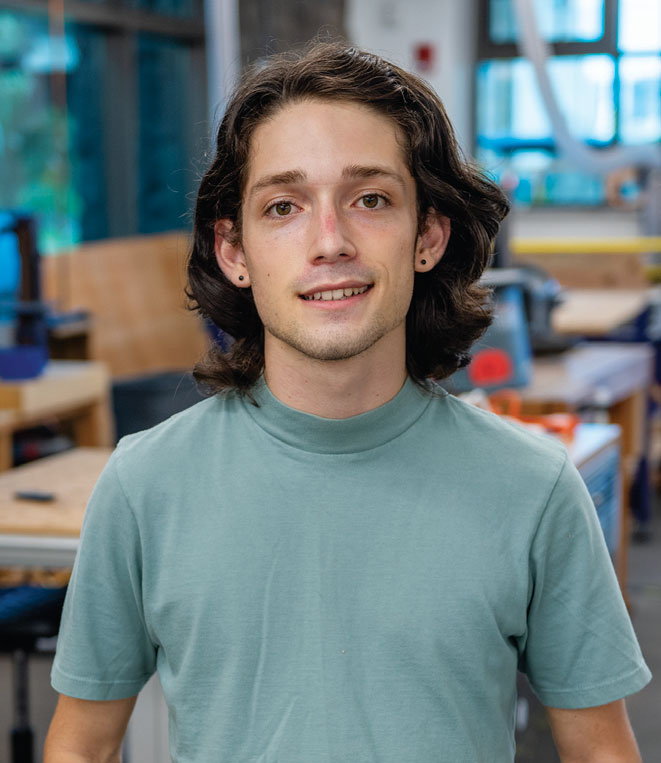
Sometimes school walls can feel like a barrier to the real world, but Ezra Levinson ’23 wanted to break through that illusory barrier to be an active participant and problem solver during COVID-19.
The Punahou junior is in the process of building a solar-powered community refrigerator to help combat food insecurity in a way that empowers both those who contribute to the fridge, and those seeking help.
In a YouTube video, he explained, “With charity, what you have is people in one place with more, giving to people in another place with less. Food drives help, but it doesn’t address social structure. I wanted to create a horizontal structure where it’s not about things from above being handed down. It’s all about exchange and assistance at the same level within a community.”
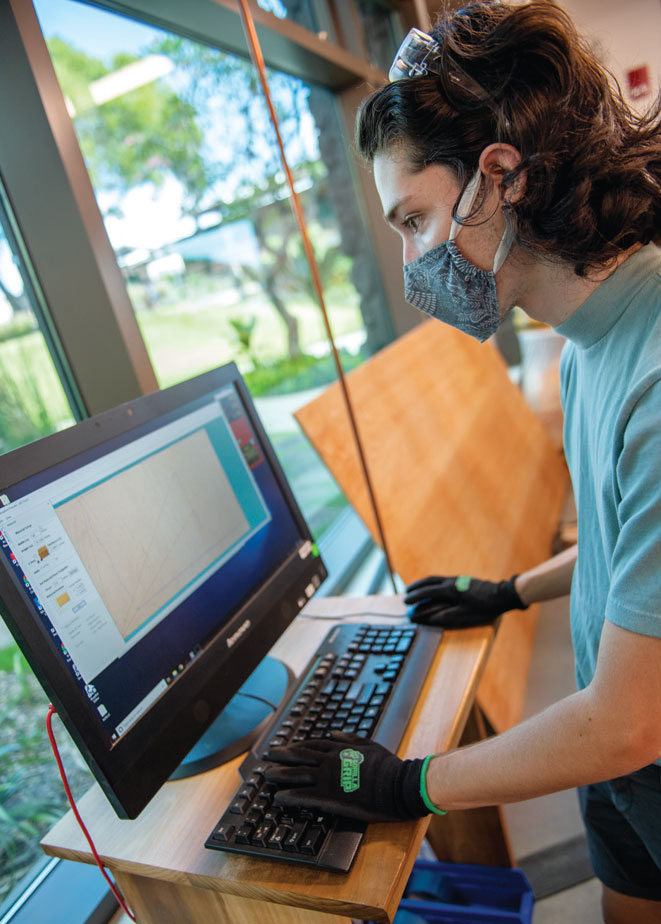
This way, he says, those with food to share can leave excess items, and recipients could pay the largesse forward by maybe leaving fruits from their trees or vegetables from their garden. It would operate as a system of mutual aid that fosters community spirit, he says. “Everyone is invited to be considerate of the needs of others when they leave or take something.”
Levinson’s project sprung from a Punahou course, Global Sustainability by Design: Mentorship for Community Action. Levinson enrolled in the elective because it focused on broader, real-world issues. He gravitated toward the idea of directly assisting people in the community.
Concerned about the jobless who struggled to purchase food, he came across stories of community fridge operations in other areas and decided to launch his own effort. To make the idea more sustainable, he is developing a solar-powered version that wouldn’t be a costly power drain for host properties, or could be placed anywhere off-the-grid to address houseless communities.
Recent Punahou graduate Will Gotanda ’21 helped with the design, and Levinson raised $3,000 through crowdfunding to build it. He’s still finalizing the fridge and seeking a home for it in his Kailua community where he can monitor its operation.
Ultimately, he sees his role not as the refrigerator developer, but as a resource with the blueprint and know-how for others to build on the idea and implement it within their own communities. “That’s how this project will scale, because there are unhoused and food insecure people everywhere,” he says. “There’s a real need for this in every community.”
Gregory Kim ’75, Ahnya Chang ’97, Jennifer Latham and Rachel Lau ’81

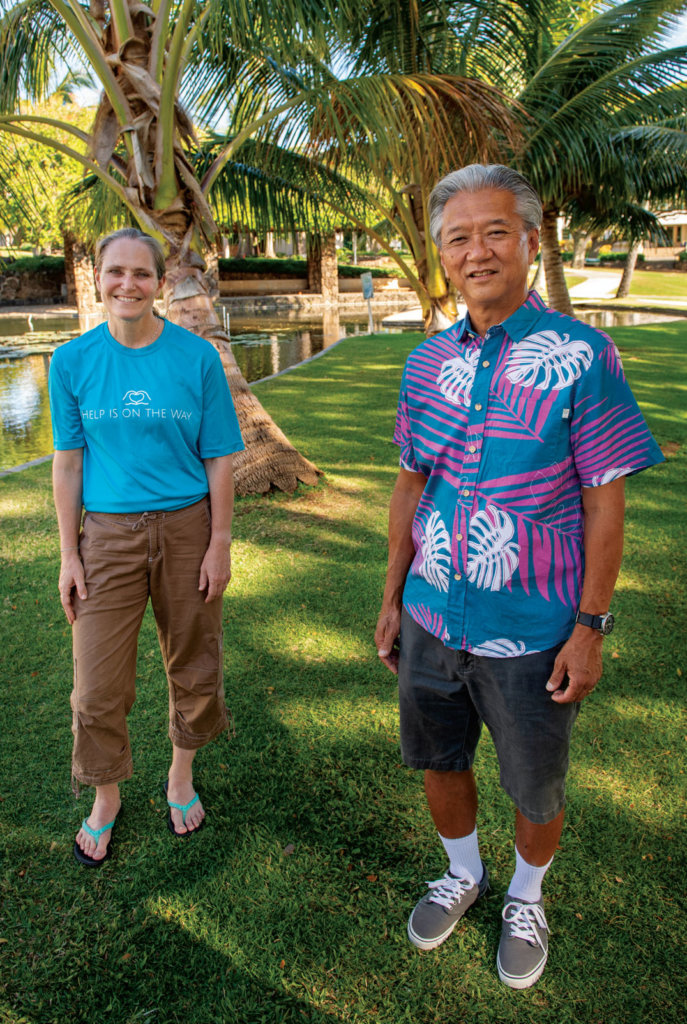
After reading news stories about seniors afraid to leave their homes early in the pandemic, attorney Gregory Kim ’75 took action to make sure the Island’s ku¯puna would have access to food and other supplies.
With the assistance of Jennifer Latham (wife of Punahou President Mike Latham ’86), faculty members Ahnya Chang ’97 and Rachel Lau ’81, as well as other community leaders, Kim launched the nonprofit Help Is On The Way as a delivery service for ku¯puna and other vulnerable individuals reluctant to leave their homes. “When we began, they didn’t need free food – they just needed help getting things, like filling prescriptions,” Kim says.
He assembled a team of volunteers – people who found themselves with extra time on their hands and an eagerness to help others in difficult circumstances. The group’s direction, however, quickly changed when it began fielding calls from people who didn’t have money for groceries. Food drives were subsequently organized at Central Union Church and Na¯ Ku¯puna Makamae Senior Center.
Chang said COVID-19 left her feeling helpless. Her initial thought was to regularly donate blood, but after meeting Kim, she volunteered to become Help Is On The Way’s vice-president and director. An active member of the group’s dispatch team, she fielded all types of calls, opening her eyes to the wide range of community needs.
“It was overwhelming, because at first we didn’t know who to call for what people needed. We had to figure it out as we went along,” she says. “I found out that a lot of smaller coastal communities like Na¯na¯ kuli and Hau‘ula had no access to City and County services, so we had to find people willing to drive halfway around the Island to make simple grocery deliveries. There were also quite a few elderly living alone, some in dire situations, but healthcare services were unable to do anything at all except in emergency situations. At those times, we alerted building managers so they could check in on them.”
With Hawai‘i’s ongoing reopening, the group decided to end its operations. Kim, however, is considering developing an app that would enable person-to-person assistance.
“We accomplished our initial goal of wanting to keep ku¯puna safe,” he says. “It wasn’t supposed to continue indefinitely, because it relied 100% on volunteerism at a time when people were sitting around doing nothing. That’s not the case today with the vaccines and people going back to work. I’m going to miss it. A lot of what we do is social outreach, being there to chat with people, so we’re going to miss them because we’ve become really friendly with a lot of clients.”
Mark Noguchi ’93

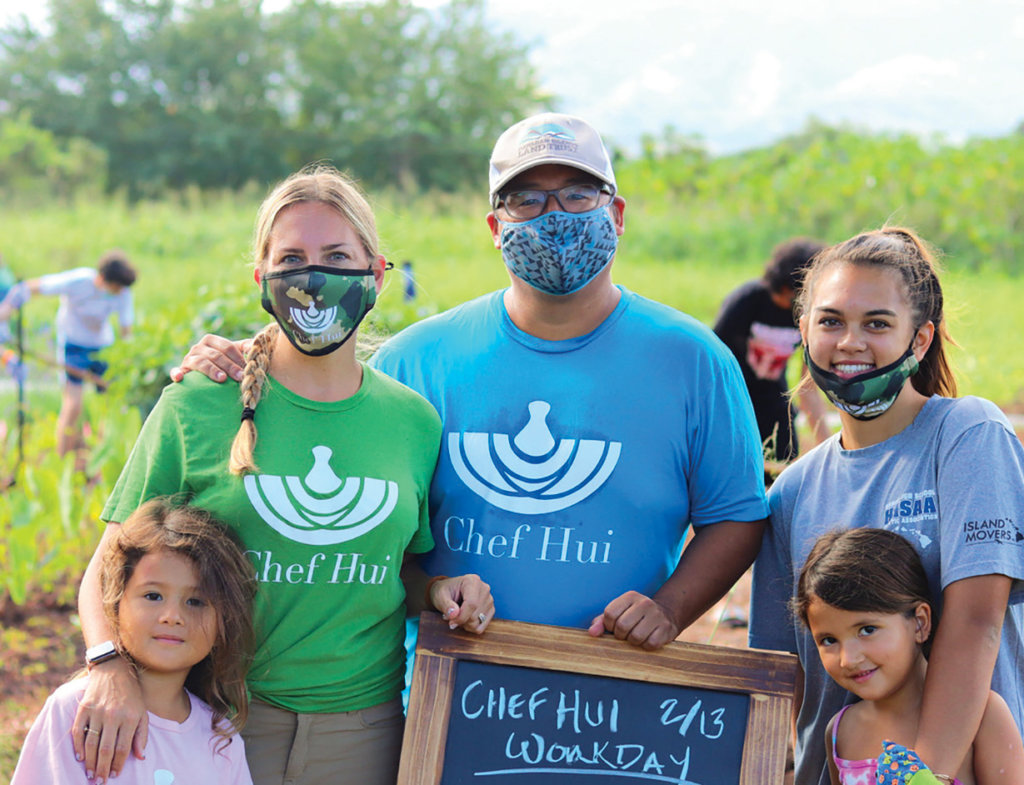
As soon as news of Honolulu’s first business shutdown was announced in March 2020, chef and Punahou’s food and sustainability specialist Mark Noguchi ’93, with his wife and business partner Amanda Corby Noguchi, got busy making phone calls.
The pair had founded Chef Hui in 2018 with the idea of connecting chefs with the communities they serve, so when the pandemic hit, they were positioned to take action. She reached out to other community organizers to determine how they could collectively respond to the crisis, while he made calls to restaurateurs who were about to have plenty of excess food on their hands.
“We knew there would have to be support for thousands of school kids who rely on their school lunch as their main meal of the day,” Mark says.
They enlisted partners Pacific Gateway Center and Aloha Harvest for help with distribution and transportation, and two days after they made their initial announcement in March 2020, they were able to collect 75,000 pounds of food in six hours to help feed hard-hit communities.
As the pandemic continued, they reestablished Chef Hui as a nonprofit to secure grant money that also allowed them to create a Give and Go Community Meal Program that could pay chefs to cook meals, creating a win-win solution for both the community and chefs in need of a new income stream. Many Punahou students and alumni have been volunteering with Chef Hui throughout the pandemic.
“Through Chef Hui, we’re able to help other chefs and organizations give back, because we have the systems and the know-how,” Mark says. “I don’t know of a single chef who isn’t interested in giving back to the community, but they often don’t know how to start.”
Although Mark said his parents never articulated the idea of community service, they led by example. “I watched my mom cooking for other people, and I saw how my father was an extremely gracious person and how people responded to him. I never forgot that and put it away for later.”
When he found himself in a position to help others and felt the appreciative response firsthand, his thoughts were, “This is cool. I like this. Not gonna lie – everybody needs those warm fuzzies. We’re all human, so let’s acknowledge that.”
Punahou Students




Helping Hawaii Foodbank
In 2019, students Chloe Saito ’22, Chase Takamori ’22 and Carissa Kanae ’22 were among many who helped with Punahou’s annual campus-wide drive for Hawaii Foodbank, spearheaded by the School’s Luke Center for Public Service. The Center has long connected students to a wide range of volunteer opportunities or incubated individual projects that address food insecurity. “But it’s not just having everyone bring a can of food,” says Dani Goddard, director of the Center. “We go into classes K – 12 to talk about food insecurity, so by the time they graduate, students are well aware of what it means.”


Students Drive PUEO Pickup
Griffin Chen ’25 was joined by Kamalau Kimata ’25, Andrew Black ’25, Pomai Chang ’25 and other student and faculty volunteers to distribute more than 3,500 pounds of food to PUEO families, as part of a School-sponsored food and technology pick-up event in early June. With the support of Ham Produce and Seafood and other suppliers, Chen, Ayden Yung ’22 and their team of student volunteers organized, packed and distributed almost 300 boxes of fruits, vegetables, proteins and other foods at the event.
During the pandemic, Chen has become a force in fighting food insecurity on O‘ahu. He organized regular food drives for the Samoan Church of Hawai‘i in Nānākuli, as well as at various public schools, distributing tens of thousands of pounds of food to families in need. His efforts were featured in the spring 2021 issue of the Punahou Bulletin.
